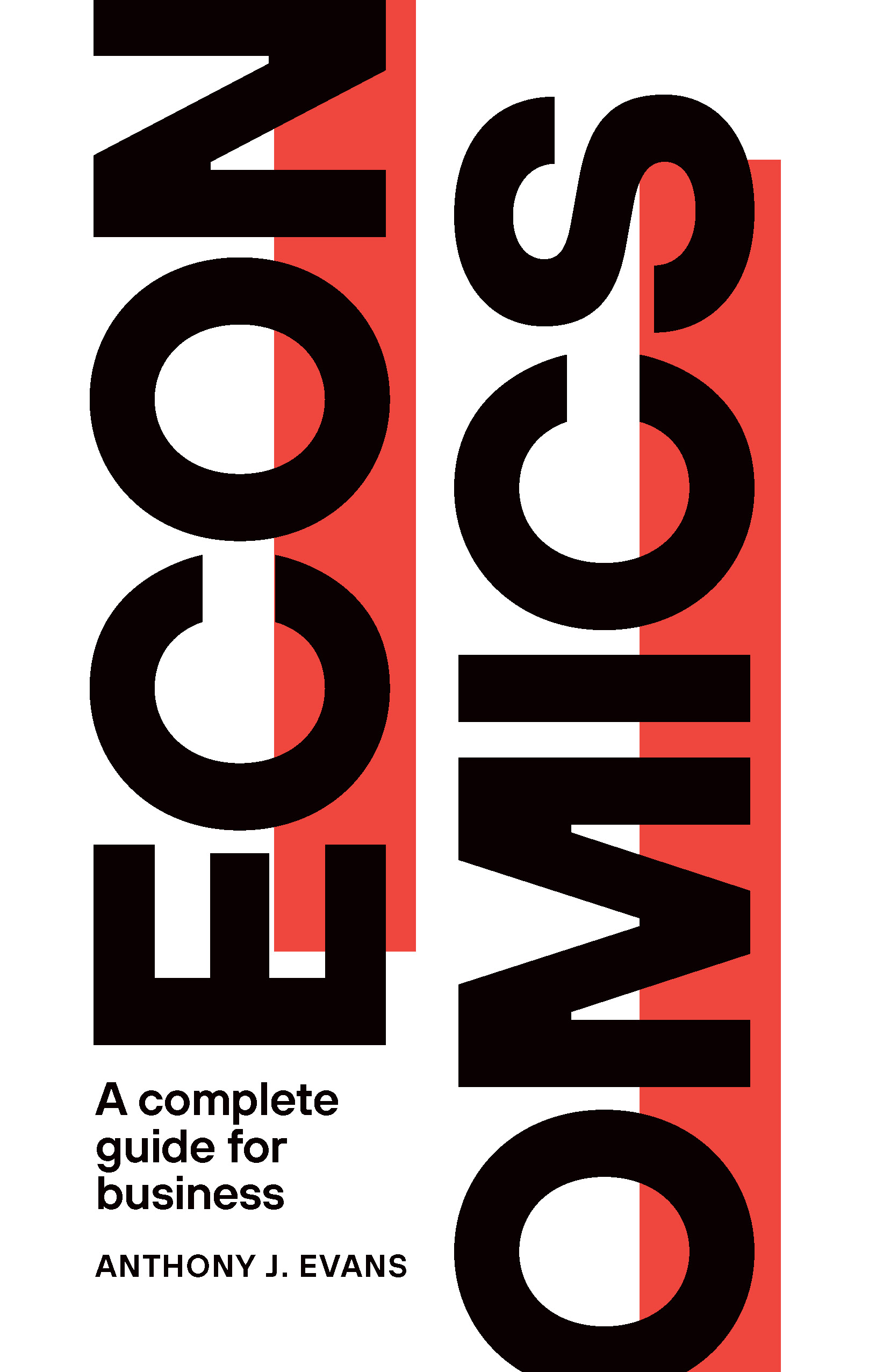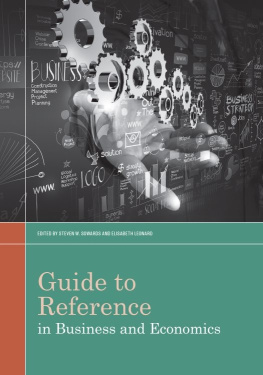Anthony J. Evans - Economics: A Complete Guide for Business
Here you can read online Anthony J. Evans - Economics: A Complete Guide for Business full text of the book (entire story) in english for free. Download pdf and epub, get meaning, cover and reviews about this ebook. year: 2021, genre: Politics. Description of the work, (preface) as well as reviews are available. Best literature library LitArk.com created for fans of good reading and offers a wide selection of genres:
Romance novel
Science fiction
Adventure
Detective
Science
History
Home and family
Prose
Art
Politics
Computer
Non-fiction
Religion
Business
Children
Humor
Choose a favorite category and find really read worthwhile books. Enjoy immersion in the world of imagination, feel the emotions of the characters or learn something new for yourself, make an fascinating discovery.

- Book:Economics: A Complete Guide for Business
- Author:
- Genre:
- Year:2021
- Rating:3 / 5
- Favourites:Add to favourites
- Your mark:
- 60
- 1
- 2
- 3
- 4
- 5
Economics: A Complete Guide for Business: summary, description and annotation
We offer to read an annotation, description, summary or preface (depends on what the author of the book "Economics: A Complete Guide for Business" wrote himself). If you haven't found the necessary information about the book — write in the comments, we will try to find it.
Economics: A Complete Guide for Business — read online for free the complete book (whole text) full work
Below is the text of the book, divided by pages. System saving the place of the last page read, allows you to conveniently read the book "Economics: A Complete Guide for Business" online for free, without having to search again every time where you left off. Put a bookmark, and you can go to the page where you finished reading at any time.
Font size:
Interval:
Bookmark:

For more resources please see www.anthonyjevans.com/books/economics
Copyright 2020 Anthony J. Evans
Published by London Publishing Partnership www.londonpublishingpartnership.co.uk
All Rights Reserved
ISBN: 978-1-913019-28-0 (ebk)
First published as Markets for Managers: A Managerial Economics Primer (The Wiley Finance Series) by John Wiley & Sons, 2014
A catalogue record for this book is available from the British Library
This book has been composed in Adobe Garamond Pro
Copy-edited and typeset by T&T Productions Ltd, London www.tandtproductions.com
Cover design by Eleanor Hyland-Stanbrook
Preface
This book was first published as Markets for Managers: A Managerial Economics Primer , in 2014. The main reasons for writing a revised edition were to correct some typos, update the choice of examples, and fill in some missing content. I spent the summer of 2019 going through the original manuscript, and enjoyed the task of reassessing the material. You will find new sections on platforms, ecological economics, and austerity, as well as the advantages of five extra years of teaching experience. When I wrote the book, I opted for seminal examples, rather than recent ones. New examples have been included on the same basis, such that they span a range of time and place.
I have resisted the temptation to deviate from the original aim of the book (which was to be a middle ground between a work of pop economics and a traditional textbook), and believe that it serves as an even more useful resource for new students and interested general readers. All of the clutter and complex explanation that you would expect from a weightier volume (such as graphs, problem sets and links to further resources) are on the website ( www.anthonyjevans.com/books/economics ).
I believe that formal education is the best way to learn the key insights from managerial economics, but not everyone has the time or finances to undertake an entire MBA programme. This book provides a solid foundation in the most important subject of any management course economics. It treats you as an intelligent, curious, but demanding reader. There is enough intellectual depth to ensure that you develop a solid understanding of the concepts, but enough practical examples to help you apply them creatively. It trains you how to become an economic thinker, and utilize that in a range of decision-making contexts.
I appreciate the praise and support that Markets for Managers received, and I hope that this new version is just as successful. In particular, I thank students at ESCP Business School and Cotrugli Business School.
Preface to Markets for Managers
I have been fortunate to learn economics from some of the best teachers in the world. When I first stepped into a classroom to teach, in 2006, I felt overwhelmed by the task of condensing so much of the wonder of economics into such a short space of time. I still do.
This book originates from the lecture notes Ive used in the classroom. It reflects the courses Ive followed, and textbooks Ive read. Although Ive tried to provide extensive references I am probably guilty of oversight. I dont claim any originality or expert skills at synthesis. I have utilized lots of quotes and links to emphasize that I see myself as a guide, rather than a guru. Most books aimed at time-poor professionals have an easy-to-communicate (i.e. simple) central idea that is presented in a counterintuitive way with well-written anecdotes. This book takes a step back. It is for people who enjoy pop economics, but want something more substantial. It fills in some of the holes, and stretches out a broad and serious look at the discipline of economics.
I cannot hope to replicate the content and delivery of a managerial economics course in book form. What I have tried to do is provide a substitute for the passive element of a formal MBA. If you want an overview of key concepts, embedded in examples, then this book is enough. But to really understand the material you need to discuss it, and apply it. These are the activities I like to spend class time doing, and they cannot be replicated on the page. New technologies are making learning cheaper, and with fewer barriers, and I hope this book can play a role. But only as a complement to other sources of information and other methods of learning.
I wish to offer special thanks to the following for commenting on early versions of the text: Toby Baxendale, Tom Clougherty, Othman Cole, David Howden, Benjamin Powell, David Skarbek, Terence Tse and Wolf von Laer.
In October 2013 I made a visit to Washington, DC, for a manuscript workshop, and appreciate the time and help of Paul Dragos Aligica, T. Clark Durant, Matthew Mitchell, Nick Schandler, Ionut Sterpan and Vlad Tarko. In particular, Nick is someone who has accompanied this book from its earliest inception all the way through to spotting typos on the final draft.
In November 2013 I held a manuscript focus group in London, and received exceedingly useful comments and feedback from Sam Bowman, Anton Howes, Robert C. Miller and Ben Southwood. It was held under the auspices of a Kaleidic Economics quarterly meeting and I thank all of the members for their collegiate backing.
I also want to acknowledge the support and advice provided by my friends and family. This book has required periods of fixation and I could not have done that without Faith. As a student, I thought of myself as an economist, writer and coach. But being a son, husband and father is my arcadia.
Finally, the primary motivation for writing this book is to provide a resource for my students. It is to them that I dedicate this work.
Introduction
Managers cant just employ economists, they must become economists.
Shlomo Maital
I magine that it is 1910 and you are presented with the following list of problems:
- To build and maintain roads adequate for use of conveyances, their operators and passengers.
- To transport physically a person from Manchester to Washington, DC, in around eight hours.
- To convey instantly the visual replica of an action, such as a football match, to devices that people can fit in their pocket.
- To find a way for women to be able to have sex without having children, or to have children without having sex.
- To increase the average span of life by thirty years.
Put in this way, doesnt the first item seem easiest? And indeed this is the one that governments were committed to achieving, but with dubious success. In comparison, as John Sparks said, the other problems would have seemed fantastic and quite likely would have been rejected as the figments of someones wild imagination. And yet all of those have been accomplished. We barely give them a second thought.
This isnt to ignore the role that government plays in the medical and engineering achievements of modernity, but it is telling that the greatest achievements tend to stem from the creativity and tenacity of free individuals. Not from central planning, but from decentralized experimentation. This book will provide the economic ammunition for the argument that great things happen when people are free to try. Managerial economics helps us to understand the policy framework that is required for this to happen, and the toolkit that can then be used to create genuine value. I hope to engender a profound respect for the use of markets as a means to solve complex social issues.
If this book has a unifying theme it is that markets are incredible. We use them every day, and largely take them for granted. But the poetry of economics is to marvel at the mundane. This book helps you to see markets in a new light, to appreciate how they operate, and to reflect on their results. We are totally familiar with markets, but they are remarkable accomplishments of human interaction. Indeed the science of economics is to make the mundane intelligible. To use the economic way of thinking to discover the strengths of markets and the conditions that are needed for them to work. This book will help you to understand how markets function and how they impact managerial decision-making. But we will also go beyond this. We will see how managers can use markets as a management tool both in terms of internalizing the insights into their daily actions, and in terms of adopting processes that can be applied across the organization. I want to show you how markets generate social prosperity, but also how managers can use markets and the principles on which they rest to generate value.
Font size:
Interval:
Bookmark:
Similar books «Economics: A Complete Guide for Business»
Look at similar books to Economics: A Complete Guide for Business. We have selected literature similar in name and meaning in the hope of providing readers with more options to find new, interesting, not yet read works.
Discussion, reviews of the book Economics: A Complete Guide for Business and just readers' own opinions. Leave your comments, write what you think about the work, its meaning or the main characters. Specify what exactly you liked and what you didn't like, and why you think so.








